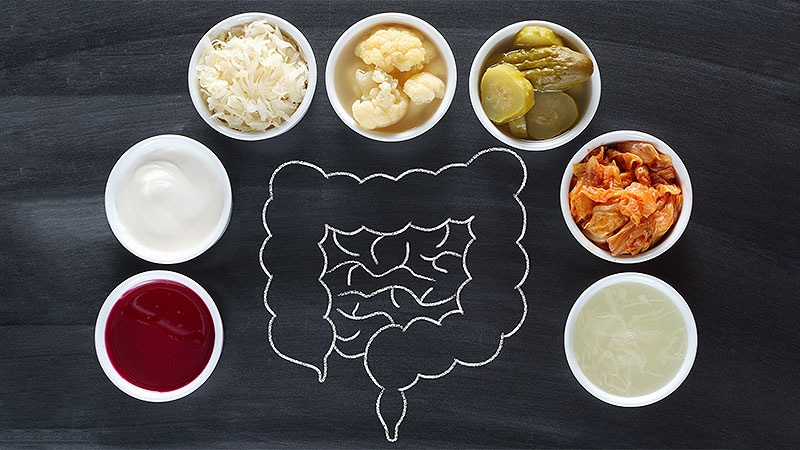When used as an adjunctive treatment, probiotic supplements reduce symptoms in patients with major depression, results of a randomized placebo-controlled trial suggest.
By the end of the 8-week pilot study, participants who had an incomplete response to antidepressants prior to taking probiotics scored better on measures of anxiety and depression vs placebo.
“This was a pilot study, designed as an initial exploration of whether improving gut health with probiotics could act as a new pathway for supporting mood and mental health,” study investigator Viktoriya Nikolova, PhD, Institute of Psychiatry, Psychology and Neuroscience at King’s College London, UK, told Medscape Medical News.
“While very promising and exciting, our findings are only the first step, and larger trials are needed,” she noted.
The findings were published online June 14 in JAMA Psychiatry.
Gut-Brain Axis
It is estimated that up to 60% of people taking antidepressants for major depressive disorder (MDD) do not achieve full response.

Dr Viktoriya Nikolova
With an eye on the so-called gut-brain axis as a treatment target for depression, the researchers conducted a meta-analysis of seven randomized controlled trials (RCT) in 2021 and found that probiotics appeared effective in reducing depressive symptoms when taken alongside antidepressants. The studies in this meta-analysis either reported poor adherence rates or did not investigate how well study participants tolerated probiotics.
To further investigate, Nikolova and team launched a pilot RCT by recruiting study participants from primary and secondary healthcare services, and through general advertising in London. Data were collected from September 2019 to May 2022.
They included 49 adults diagnosed with MDD with an incomplete antidepressant response, indicated by a score of greater than 13 on the Hamilton Depression Rating Scale-17 (HAMD-17).
Half of the participants were randomly assigned to receive a widely available, proprietary, 14-strain blend probiotic supplement, and half received placebo. Both groups took their study drug four times per day during the 8-week trial.
At baseline, 4 weeks, and 8 weeks, investigators assessed the participants for depression with the HAMD-17, the Inventory of Depressive Symptomatology (IDS) Self-Report, and anxiety with the Hamilton Anxiety Rating Scale (HAMA).
The majority of participants (80%) were female with mean age of 32. Adherence was high, with 97% of the doses taken as required, and no adverse events were reported.
Standardized effect sizes (SES) from linear mixed models demonstrated that when compared with the placebo group, the probiotic group had more improvement in depressive symptoms according to the HAMD-17 (week 4: SES, 0.70; 95% CI, 0.01 – 0.98) and IDS Self Report (week 8: SES, 0.64; 95% CI, 0.03 – 0.87).
When compared with the placebo group, the probiotic group also experienced greater improvements in anxiety symptoms according to the HAMA (week 4: SES, 0.67; 95% CI, 0 – 0.95; week 8: SES, 0.79; 95% CI, 0.06 – 1.05).
Nikolova said a large follow-up trial is planned to further confirm the results.
A Key Place for Probiotics in Mental Health
Commenting for Medscape Medical News, Uma Naidoo, MD, said, “As I shared throughout my first book, This is Your Brain on Food, there is a real place for the use of probiotics in mental health, including the importance of the gut-brain connection.”
Naidoo is the director of nutritional and metabolic psychiatry at Massachusetts General Hospital and of nutritional psychiatry at the MGH Academy.
She noted that when a person stops using a probiotic after trying it out, the positive changes in the gut are reversed, so “remaining consistent in taking the probiotic is important if you have found it helpful for your mood.”
Naidoo added that “each person’s gut microbiome is so unique that it is likely not every human being will have the same reaction to a probiotic.”
“Eating foods with live probiotics may also benefit gut health and, therefore, mood,” she said. The same goes with eating fermented foods with live active cultures.”
The study was funded by a Medical Research Council Industrial CASE PhD Studentship with ADM Protexin (supplier of the probiotics) as the industry partner and additional support from Freya Green. Nikolova has received grants from the Medical Research Council and ADM Protexin during the conduct of the study as well as personal fees from Janssen outside the submitted work.
JAMA Psychiatry. Published online June 14, 2023. Full text
For more Medscape Psychiatry news, join us on Twitter and Facebook
Source: Read Full Article
